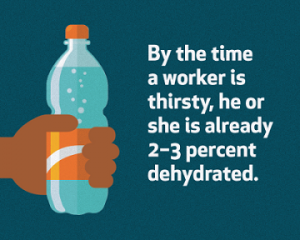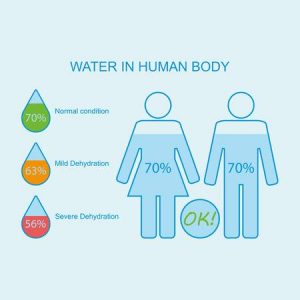
Human body comprises 75% water which is present in both intracellularly and extracellularly. Dehydration refers to a condition that involves excessive loss of body water, leading to disturbed metabolic processes. It is generally an imbalance between water loss vs. water intake.
CAUSES
- Diarrhea – Usually when large intestine is unable to hold water in a condition like fever or infections, it excretes water resulting in dehydration.
- Vomiting – Nausea & vomiting restricts the ability to hold down water thereby reducing the intake.
- Sweating – In certain conditions like humid and hot weather, strenuous physical activity and fever, the sweating increases. This is body’s defense mechanism which leads to dehydration.
- Diabetes – Due to the consistent rise in blood sugar, the body tends to excrete glucose via urine, removing water along with it and leads to dehydration.
- Frequent urination – Conditions like diabetes, excessive alcohol intake, and certain medications such as diuretics, antihypertensives, antihistamines, antipsychotics, leads to frequent urination.
- Burns – Skin is the first protective barrier for the body which also regulates fluid loss. Dehydration in burn cases is caused due to the inability of the skin to prevent this fluid loss.
Signs & Symptoms
Mild to moderate dehydration can lead to signs & symptoms like:
- Increased thirst
- Dry mouth
- Tired & sleepy
- Decreased urine output
- Yellowish color of the urine
- Headache
- Dizziness
- Dry skin
- Muscle cramps
- Palpitations
- Bad breath
- Dry eyes & blurred vision
Severe dehydration can lead to following symptoms:
- Results in low urine output along with a change in color to deep yellow.
- Dizziness may hamper regular walking and standing.
- Low blood pressure
- Rapid heart rate
- Sunken eyes
- Fever
- Poor skin elasticity
- Lethargy, confusion, or coma
- Seizure
- Shock
 Risk factors
Risk factors
Usually, dehydration can happen to anyone, but specific factors increase the risk as follows:
- Infants and children: Dehydration can occur to any individual of any age. However, it is prevalent in infants and younger children.
- Older Adults: With age there is a reduction in body’s reserves of fluids. Bedridden adults have mobility restriction hence low consumption.
- People with chronic illnesses: Chronic conditions like uncontrolled diabetes or kidney failures lead to dehydration. Having cold and cough also decreases your consumption leading to dehydration.
- People who work or exercise outside: Laborers, athletes or people at higher altitudes also tend to dehydrate more because of the climatic conditions.
Complications
- Kidney failure: It is one of the most common complications, however, if it is only due to dehydration, it can be treated.Dehydration causes a decrease in the fluid volume and fall in blood pressure. Hence decreased blood flow to the kidney may result in its failure.
- Shock: Due to an imbalance in fluid maintenance, blood and oxygen supply to all the vital organs gets compromised resulting in their failure.
- Heat-related illnesses: In conditions like heat stroke, body’s ability to cool itself may result in dehydration to a point that it leads to muscle spasms.
- Electrolyte abnormalities: Dehydration causes not only loss of fluid but important minerals like sodium and potassium also. Deficiency of these electrolytes can further lead to muscle weakness or seizures.
- Swelling of the brain (cerebral edema): When enough fluids are not consumed even after being dehydrated, cells try to pull more water resulting in swelling and rupturing.
- Coma: Decreased blood supply to the brain can cause confusion and eventually lead to coma.
Diagnosis
Apart from diagnosing the reason for dehydration, it’s imperative to assess the degree of dehydration as well.
The initial assessment may include:
- First evaluation to check if the patient is awake, oriented and alert.
- Vital evaluation includes blood pressure and pulse rate readings.
- Temperature is measured to check for fever.
- Skin examination to check for sweating (armpit and groin) and degree of elasticity.
- Tongue and mouth examination to check the extent of dryness.
- Infants and young children can have extra evaluations such as checking for any soft spot on the skull, assessing sucking ability, sweat loss in armpits and groin, muscle tone, weight difference evaluation.
Laboratory testing
The laboratory tests are done to assess any degree of electrolyte imbalances. Other tests may be ordered based upon the cause of dehydration or the severity of illness or initial assessment done.
- Elevated hemoglobin and red blood cell counts indicate dehydration as blood becomes more concentrated due to fluid loss.
- Elevation in kidney function test( blood urea nitrogen and creatinine).
- Urine analysis to evaluate the urine clarity, color, presence of ketones describes the extent of dehydration.
Treatment
- Foremost loss of water can be treated by increasing fluid consumption. Fluids like water, clear liquids or sports drinks. Reducing the physical activity for a period of time, therby controlling the water loss due to sweating.
- Over-the-counter oral rehydration solution containing water and salts in definite proportions can be given to infants and kids suffering from diarrhea and vomiting.
- Athletes can carry sports drinks containing carbohydrate solutions and electrolytes during hot and humid conditions.
- Sometimes depending on the severity of dehydration intravenous fluids can be given to rehydrate.
Prevention
Following formula can be used to calculate daily fluid requirement :
- For first 10 kg of your body weight, intake 100 mL per kg of fluid daily.
- For next 10 kg of your weight, intake an additional 50 ml/kg of fluid.
- For next every additional kg of your weight, an addition of 10 ml /kg fluid is required.
This is the basic requirement of fluid. Consumption of more fluid is required to compensate for losses like sweating, vomiting or diarrhea
- Have a habit of drinking water without waiting for a sense of thirst. Keep a reminder & drink water frequently throughout the day.
- If the temperature is high or physical activity is more, increase your consumption accordingly.
- Don’t starve for long hours & don’t skip your meals. Most of the fluids intake occurs via meals.
- Eat a diet rich in fruits & vegetables as they are also a source of fluids & can prevent dehydration.
- Avoid or restrict consumption of caffeine beverages like tea, coffee or soft drinks or alcoholic beverages.
About The Author
Ms. Ratika Vinchurkar– MSc, Food & Nutrition, RxDx.
For booking, appointment call us today!!!
If you have further questions then please contact us on.



